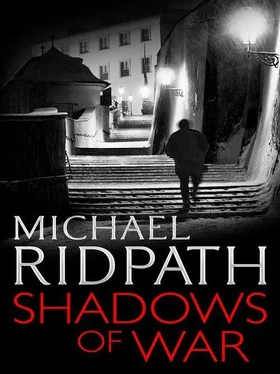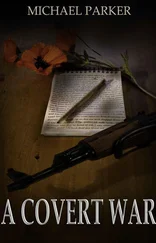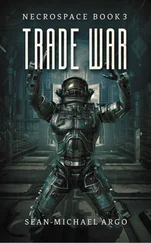‘Is there nothing you wouldn’t do for peace, Father? Is no price too high?’
‘One life is priceless,’ said Oakford. ‘Fifteen million people died in the last war. That’s fifteen million times priceless. So no, Conrad, no price is too high.’
Conrad understood his father. The war hero with the Victoria Cross and the missing arm had devoted his life to preventing another war. He believed in peace at any cost. In Henry Alston he saw the means that justified that end. He was blind, wilfully blind, to Alston’s motives for bringing peace. He didn’t care as long as an armistice was declared.
‘You know Constance did kill Millie, Father?’ said Conrad, trying another tack.
‘I’m not listening to you any more,’ said Oakford. ‘In fact, Constance and I are leaving now.’ He got to his feet. ‘Thank you for your hospitality, Madame de Salignac,’ he said in French. ‘I am afraid we must leave. I apologize for the suddenness of our departure.’
‘I won’t let you go,’ said Conrad, also standing.
‘One moment,’ said the old lady, in French. ‘I have something inside for you.’
She climbed to her feet, took her stick and hobbled inside. Her four guests waited.
Conrad knew he could never persuade his father to abandon his mission. He hated seeing Constance, Millie’s murderer, at his father’s side. He would have to stop him somehow.
The old lady reappeared. ‘Here, you might need this,’ she said in English. She had put her stick to one side and was limping out into the courtyard. In her hands was a shotgun. She handed it to Conrad. ‘I was ten in 1870 when the Prussians arrived in Paris. I saw how they behaved then. Two of my three sons died in the war of 1914. I hate the Boche, Lord Oakford. The French people will never surrender to them again, and neither should the British.’
Her blue eyes were blazing with anger. ‘You should listen to your son, Lord Oakford.’
Conrad took the shotgun, and slowly pointed it at his father.
‘What are you going to do with that, Conrad?’ said Oakford. ‘Shoot me?’
‘I will if I have to,’ said Conrad. Would he? He didn’t know.
‘I think you might,’ said Lord Oakford. ‘But I don’t care. I told you once about that afternoon at Passchendaele when I took that machine-gun post, didn’t I? How, after I turned the German machine gun on those young German boys and mowed them down, I walked unarmed towards their line. How I expected them to shoot me — I wanted them to shoot me. I was sick with myself for killing so many. I vowed then that I would never kill another man, that peace was more important than my life.’
Conrad remembered that story well.
‘Come on, Constance,’ said Oakford. He began to move towards the Packard.
‘You can’t let him go, Conrad,’ said Veronica. ‘You must pull the trigger!’
Conrad knew she was right. If Conrad was prepared to sacrifice his own life for what he believed was right, and he knew he was, then he should be willing to sacrifice his father.
Whatever he decided, he knew he would have to live with it for the rest of his life.
He couldn’t do it. Logic might tell him to pull the trigger, but he couldn’t do it.
His father had his back to him and had almost reached the car. Conrad took several rapid paces towards him. Lord Oakford’s shoulders stiffened as he sensed Conrad’s approach, but he didn’t turn round. Conrad raised the shotgun and brought the stock down hard on his father’s skull.
There was sickening crack, and Lord Oakford crumpled to the ground.
‘Take this,’ said Conrad, handing the shotgun to Veronica.
He bent down over his father. He had had no idea how hard to hit him. Lord Oakford was fit, wiry and not yet sixty. Conrad’s intention had been to knock him out, without doing him permanent damage, but he feared he had hit him too hard. It was impossible to judge the weight of a blow like that.
Oakford was lying face down on flagstones, blood seeping from a cut on the back of his head. His eyes were shut and he was motionless. Conrad couldn’t tell whether he was breathing. He put his fingers on his father’s neck hoping to find a pulse.
He heard movement behind him, and turned to see Constance lunge at Veronica, who was staring at Conrad and Oakford, holding the shotgun loosely in front of her. Veronica was a bigger woman than Constance, but was taken by surprise. Constance grabbed the barrel of the shotgun with both hands and yanked. Veronica let go.
Constance skipped backwards a few paces and turned the gun on Veronica. ‘Keep still, or I’ll blow your head off!’
The Loire Valley, 24 May
Veronica kept still.
‘Get back!’ Constance ordered.
Veronica hesitated and then retreated. It was clear that Constance had never fired a shotgun before. She was holding the gun awkwardly in front of her. But it was pointed directly at Veronica, Constance’s finger was on the trigger and Conrad could see that the safety was off. All she had to do was squeeze and Veronica would be dead.
‘Further back,’ said Constance. Veronica took two steps back. She was now standing next to Conrad and a few paces away from Constance.
‘Is he all right?’ Constance asked Conrad.
‘I don’t know,’ said Conrad.
‘Well, check!’
Conrad bent over his father again and searched for the artery in his neck. At first he felt nothing. He forced himself to take it slow. He moved his fingers and felt something. A pulse! ‘He’s alive,’ he said. ‘But he’s out cold.’
‘All right,’ said Constance. She was clearly thinking through what she would do next. Conrad tried to guess her next move. Shoot him; that was the obvious answer. It was a double-barrelled shotgun, presumably with a cartridge in each barrel. So she could afford to loose off one at him and keep the other to cover Veronica and Madame de Salignac.
In which case, maybe Conrad should rush her first, in the hope that somehow she missed him. The odds didn’t look good, but the odds of doing nothing looked worse.
Then his father groaned. His eyes flicked open.
‘Leave him!’ said Constance.
Get her talking, thought Conrad. Distract her. Play for time.
‘You did kill Millie, didn’t you, Constance?’ Conrad was hoping for an admission that his father might hear.
‘Yes,’ said Constance. ‘I had to. I liked your sister, she had good intentions, but in the end she was going to blow the whistle on the whole plan. Your friend Theo told her that the Duke of Windsor had been passing secrets to the Germans. That he was a traitor. At that stage I didn’t know the details of what Henry was planning, but I knew I had to shut her up. There was only one way of doing that.’
‘And Freddie Copthorne? Was he the same?’
‘Yes. He lost his nerve. Henry had to do something. At least your father knows his duty.’
‘What do you mean?’
Oakford groaned again, and moved on the ground.
‘You heard him,’ said Constance. ‘He was willing to die for the cause of peace with Germany. Lloyd George is a very old man. It won’t be long before he steps aside for Henry, and then Britain will have a truly great Prime Minister. Don’t you see that with Germany as our ally and not our enemy, there will be nothing to stop Britain becoming great again? The French are pathetic; all the Americans are concerned about is money. Only we know how to rule. And the Germans.’
Oakford pulled himself to a sitting position and rubbed his skull. Then he looked at his one hand. There was blood on it. The hair on the back of his head was matted red.
‘Help your father into the back of the car,’ said Constance.
Conrad lifted his father to his feet, but Oakford’s knees buckled. So Conrad lifted him bodily and carried him to the Packard. He opened the rear door and eased his father into the back seat.
Читать дальше












